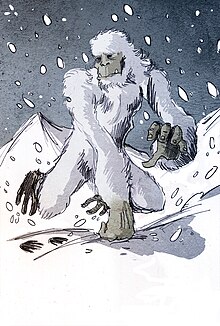Yeti
|
An illustration of a Yeti by Phillipe Semeria
|
|
| Similar creatures | Bigfoot, Skunk Ape, Yeren, Yowie, Mande Barung, Orang Pendek, Almas, Barmanou |
|---|---|
| Other name(s) | Abominable Snowman Migoi, Meh-teh et al. |
| Country | Nepal, Pakistan, Bhutan, China, India (called as "Bandya"), Mongolia, Russia |
| Region | Himalayas |
| Habitat | Mountains |
In the folklore of Nepal, the Yeti (/ˈjɛti/) or Abominable Snowman (Nepali: हिममानव himamānav, lit. "snow man") is an ape-like entity taller than an average human that is said to inhabit the Himalayan region of Nepal, Bhutan and Tibet. The names Yeti and Meh-Teh are commonly used by the people indigenous to the region, and are part of their history and mythology. Stories of the Yeti first emerged as a facet of Western popular culture in the 19th century.
The scientific community has generally regarded the Yeti as a legend, given the lack of conclusive evidence. In one genetic study, researchers matched DNA from hair samples found in the Himalaya with a prehistoric bear from the epoch.
The word Yeti is derived from Tibetan: གཡའ་དྲེད་, Wylie: g.ya' dred, ZYPY: Yachê, a compound of the words Tibetan: གཡའ་, Wylie: g.ya', ZYPY: ya "rocky", "rocky place" and (Tibetan: དྲེད་, Wylie: dred, ZYPY: chê) "bear". Pranavananda states that the words "ti", "te" and "teh" are derived from the spoken word 'tre' (spelled "dred"), Tibetan for bear, with the 'r' so softly pronounced as to be almost inaudible, thus making it "te" or "teh".
...
Wikipedia

